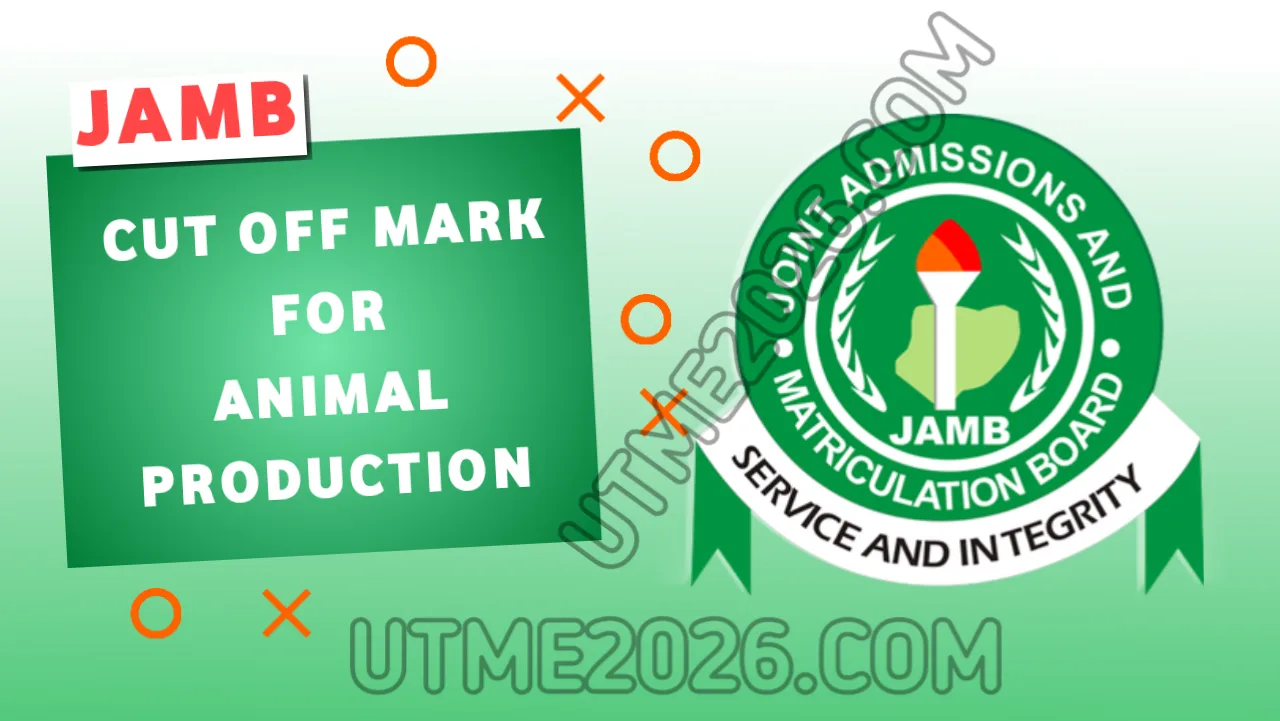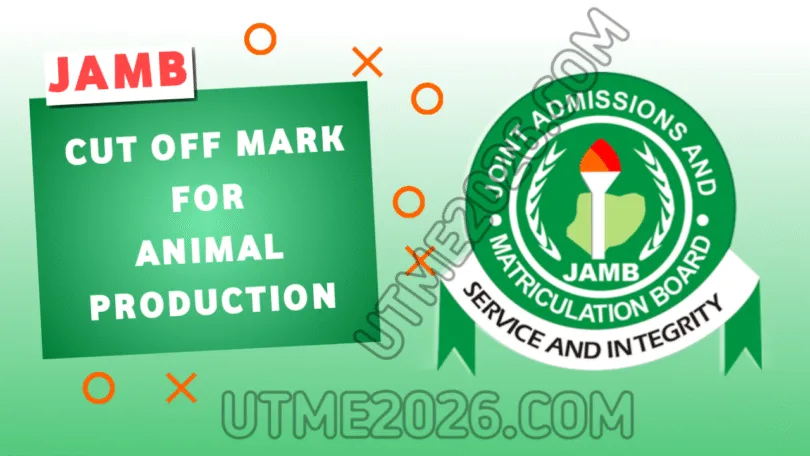The JAMB Cut Off Mark for Animal Production is a critical benchmark that determines eligibility for admission into this vital agricultural program across Nigerian universities. As aspiring students gear up for the 2026/2027 academic session, understanding the JAMB Cut Off Mark for Animal Production becomes essential for strategic preparation and realistic goal-setting.
Animal Production focuses on livestock management, breeding, nutrition, and sustainable farming practices, making it a rewarding choice for those passionate about agriculture and food security.
The Joint Admissions and Matriculation Board (JAMB) sets a general minimum score, but individual universities often raise it based on demand and capacity. For the upcoming session, the baseline JAMB Cut Off Mark for Animal Production hovers around 150 to 180, varying by institution type and competitiveness.

JAMB Cut Off Mark for Animal Production
Overview of Animal Production and Admission Essentials
Animal Production equips students with skills in animal husbandry, feed formulation, disease control, and agribusiness, addressing Nigeria’s growing need for protein sources and rural development. To pursue this degree, candidates must first excel in the UTME, selecting subjects like English, Chemistry, Biology/Agricultural Science, and Mathematics/Physics.
Beyond the JAMB Cut Off Mark for Animal Production, admission hinges on O’Level credits in relevant subjects, post-UTME performance, and sometimes catchment area preferences.
Federal universities tend to be more competitive, often requiring scores above the national minimum, while state and private institutions may offer more flexibility. Early preparation, including past questions and mock exams, is key to surpassing the JAMB Cut Off Mark for Animal Production. Note that these marks are provisional and subject to official JAMB policy meetings; always verify with institutions for updates.
Federal Universities Offering Animal Production
Federal universities, funded by the government, provide subsidized education and attract high applicant volumes, leading to elevated cut-off marks.
For the 2026/2027 session, expect the JAMB Cut Off Mark for Animal Production in these schools to range from 160 to 200, reflecting their prestige and limited slots.
| University Name | Location | JAMB Cut Off Mark |
|---|---|---|
| University of Ibadan (UI) | Ibadan, Oyo | 200 |
| Ahmadu Bello University (ABU) | Zaria, Kaduna | 180 |
| University of Nigeria Nsukka (UNN) | Nsukka, Enugu | 180 |
| Obafemi Awolowo University (OAU) | Ile-Ife, Osun | 200 |
| Federal University of Agriculture Abeokuta (FUNAAB) | Abeokuta, Ogun | 160 |
| Michael Okpara University of Agriculture Umudike (MOUAU) | Umudike, Abia | 160 |
| University of Maiduguri (UNIMAID) | Maiduguri, Borno | 160 |
| Usmanu Danfodiyo University Sokoto (UDUSOK) | Sokoto | 160 |
| Federal University of Technology Owerri (FUTO) | Owerri, Imo | 180 |
| University of Ilorin (UNILORIN) | Ilorin, Kwara | 180 |
| Bayero University Kano (BUK) | Kano | 180 |
| Federal University of Technology Akure (FUTA) | Akure, Ondo | 180 |
| University of Port Harcourt (UNIPORT) | Port Harcourt, Rivers | 180 |
| Federal University Dutse (FUD) | Dutse, Jigawa | 160 |
State Universities Offering Animal Production
State universities, owned by state governments, balance accessibility with quality, typically setting the JAMB Cut Off Mark for Animal Production at 140 to 170. They prioritize indigenes but welcome diverse applicants, making them ideal for mid-range scorers.
| University Name | Location | JAMB Cut Off Mark |
|---|---|---|
| Ambrose Alli University (AAU) | Ekpoma, Edo | 152 |
| Delta State University (DELSU) | Abraka, Delta | 150 |
| Ekiti State University (EKSU) | Ado-Ekiti, Ekiti | 160 |
| Olabisi Onabanjo University (OOU) | Ago-Iwoye, Ogun | 150 |
| Lagos State University (LASU) | Ojo, Lagos | 160 |
| Kwara State University (KWASU) | Malete, Kwara | 150 |
| Osun State University (UNIOSUN) | Osogbo, Osun | 160 |
| Akwa Ibom State University (AKSU) | Ikot Akpaden, Akwa Ibom | 150 |
| Rivers State University (RSU) | Port Harcourt, Rivers | 160 |
| Abia State University (ABSU) | Uturu, Abia | 160 |
| Enugu State University of Science and Technology (ESUT) | Agbani, Enugu | 150 |
| Nasarawa State University (NSUK) | Keffi, Nasarawa | 150 |
| Taraba State University (TSU) | Jalingo, Taraba | 140 |
Private Universities Offering Animal Production
Private universities offer premium facilities and flexible admissions, with the JAMB Cut Off Mark for Animal Production generally at 140 to 160. They focus on innovation, like biotech in livestock, and accept direct entry candidates.
| University Name | Location | JAMB Cut Off Mark |
|---|---|---|
| Igbinedion University Okada | Okada, Edo | 150 |
| Madonna University | Okija, Anambra | 150 |
| Bowen University | Iwo, Osun | 150 |
| Covenant University | Ota, Ogun | 160 |
| Redeemer’s University | Ede, Osun | 150 |
| Babcock University | Ilishan-Remo, Ogun | 160 |
| Ajayi Crowther University | Oyo, Oyo | 150 |
| Lead City University | Ibadan, Oyo | 150 |
| Bells University of Technology | Ota, Ogun | 150 |
| Crawford University | Faith City, Ogun | 150 |
| Landmark University | Omu-Aran, Kwara | 160 |
| Nile University of Nigeria | Abuja, FCT | 150 |
| Achievers University | Owo, Ondo | 150 |
Strategies to Meet the JAMB Cut Off Mark for Animal Production
To secure admission, start by registering early for UTME and choosing Animal Production as your first choice. Aim for balanced subject scores, as universities aggregate them. Post-UTME preparation is crucial; practice aptitude tests mirroring university formats.
If your score falls short of the JAMB Cut Off Mark for Animal Production, consider change of institution via JAMB portal or supplementary lists. O’Level results must include at least five credits, including Mathematics and English. Track admission timelines through CAPS (Central Admissions Processing System) to avoid missing deadlines. Networking with alumni via forums can reveal insider tips on beating cut-offs.
Career Prospects in Animal Production
Graduates of Animal Production thrive in roles like farm managers, veterinary assistants, feed mill operators, and extension officers. With Nigeria’s livestock sector valued at billions, opportunities abound in exports, dairy processing, and sustainable farming startups. Advanced studies lead to PhDs in animal genetics, while certifications in organic farming boost earnings. The field aligns with SDGs on zero hunger, ensuring job stability amid population growth.
READ ALSO: JAMB Cut Off Mark for Agricultural Science 2026/2027
FAQs
What is the minimum JAMB Cut Off Mark for Animal Production in 2026/2027?
The general minimum is 150, but most universities require 160 or higher for competitiveness.
Can I study Animal Production with 140 in JAMB?
Yes, in select private or state universities, but federal ones demand more.
Which subject combination is best for Animal Production?
English, Chemistry, Biology or Agricultural Science, and Physics or Mathematics.
Does post-UTME affect the JAMB Cut Off Mark for Animal Production?
Yes, many schools combine UTME and post-UTME scores for final merit lists.
Are there scholarships for Animal Production students?
Yes, from bodies like TETFund and agribusiness firms for high achievers.
How many years is the Animal Production degree?
Typically four years, with options for five-year integrated programs.
Can direct entry candidates apply for Animal Production?
Yes, with ND, HND, or IJMB in related fields, bypassing UTME.
What if I miss the JAMB Cut Off Mark for Animal Production?
Explore pre-degree programs or change to related courses like Fisheries.





